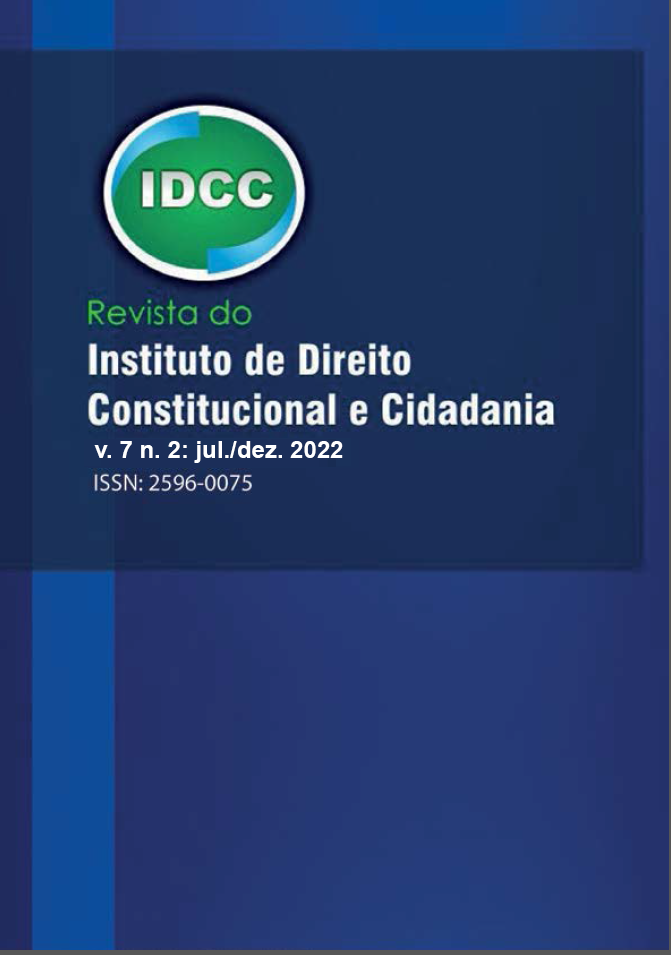Dignidade humana e neurodireitos na era digital
DOI:
https://doi.org/10.48159/revistadoidcc.v7n2.e063Palabras clave:
Neurodireitos, Dignidade Humana, Regulação neurotecnológicaResumen
Este artigo aborda os neurodireitos, enfatizando a necessidade de proteger a dignidade humana diante dos avanços das neurotecnologias e inteligência artificial. A análise define e classifica os neurodireitos e discute a evolução dos estudos e classificações desses direitos, bem como as regulamentações existentes e propostas. A conclusão destaca que a dignidade humana está sendo desafiada por novas técnicas que podem dificultar o exercício da autonomia e agência humana, tornando fundamental a regulação e a reflexão crítica sobre os impactos dessas tecnologias nos direitos humanos. O artigo ressalta a importância da educação e conscientização sobre os possíveis efeitos das neurotecnologias, assim como o estabelecimento de políticas e regulamentações que promovam o desenvolvimento ético e responsável dessas tecnologias, garantindo o acesso equitativo aos seus benefícios e preservando a dignidade e autonomia humana.
Citas
ARENDT, Florian; SCHERR, Sebastian; ROMER, Daniel. Effects of exposure to self-harm on social media: Evidence from a two-wave panel study among young adults. New Media & Society, v. 21, n. 11-12, p. 2422-2442, 2019.
BANDURA, Albert. Toward a psychology of human agency. Perspectives on psychological science, v. 1, n. 2, p. 164-180, 2006.
BUBLITZ, Jan Christoph; MERKEL, Reinhard. Autonomy and authenticity of enhanced personality traits. Bioethics, v. 23, n. 6, p. 360-374, 2009
BUBLITZ, Jan Christoph; MERKEL, Reinhard. Crimes against minds: on mental manipulations, harms and a human right to mental self-determination. Criminal Law and Philosophy, v. 8, n. 1, p. 51-77, 2014.
BÜCHI, Moritz et al. The chilling effects of algorithmic profiling: Mapping the issues. Computer law & security review, v. 36, p. 105367, 2020
CARTA de Derechos Digitales. Madrid: Ministerio de Asuntos Económicos y Transformación Digital, 2018. Disponível em: https://www.mincotur.gob.es/es-es/gabineteprensa/notasprensa/documents/2018/Carta_de_Derechos_Digitales.pdf. Acesso em: 11 abr. 2023.
Committee of Ministers of the Council of Europe: Declaration on the manipulative capabilities of algorithmic processes. (Adopted by the Committee of Ministers on 13.2.2019 at the 1337th meeting of the Ministers’ Deputies). Available at https://search.coe.int/cm/pages/result_details.aspx?ObjectId=090000168092dd4b
DECLARAÇÃO Universal dos Direitos Humanos. Adoptada e proclamada pela Resolução 217 A (III) da Assembleia Geral das Nações Unidas em 10 de dezembro de 1948. Disponível em: https://www.ohchr.org/EN/UDHR/Documents/UDHR_Translations/por.pdf. Acesso em: 11 de abril de 2023.
FARAHANY, Nita A. Incriminating thoughts. Stan. L. Rev., v. 64, p. 351, 2012.
GAZZANIGA, Michael S. "The law and neuroscience." Neuron 60, no. 3 (2008): 412-415.)
HERTZ, Nora. Neurorights–Do we Need New Human Rights? A Reconsideration of the Right to Freedom of Thought. Neuroethics, v. 16, n. 1, p. 5, 2023.
IENCA, Marcello; ANDORNO, Roberto. Towards new human rights in the age of neuroscience and neurotechnology. Life sciences, society and policy, v. 13, n. 1, p. 1-27, 2017.)
IENCA, Marcello. On neurorights. Frontiers in Human Neuroscience, v. 15, p. 701258, 2021.
Jeffrey Rosen, The Brain on the Stand, N.Y. TIMES MAGAZINE. (Mar. 11, 2007) http://www.nytimes.com/2007/03/11/magazine/11Neurolaw.t.html
Organisation for Economic Co-operation and Development (OECD), “OECD Recommendation on Responsible Innovation in Neurotechnology”, 11 December 2019: https://www.oecd.org/science/recommendation-on-responsible-innovation-in-neurotechnology.htm),
SCHERMER, Bart. Risks of profiling and the limits of data protection law. In: Discrimination and privacy in the information society. Springer, Berlin, Heidelberg, 2013. p. 137-152.
SHEN, Francis X. Law and neuroscience 2.0. Ariz. St. LJ, v. 48, p. 1043, 2016.)
SHINER, Bethany; O'CALLAGHAN, Patrick. The right to freedom of thought in the European Convention of Human Rights. European Journal of Comparative Law and Governance, 2021.
SUNSTEIN, CASS; THALER, RICHARD; LINO, MARCELLO. Nudge: O Empurrão Para a Escolha Certa. Elsevier Brasil, 2008
SUPREMO TRIBUNAL FEDERAL. Habeas Corpus nº 204422/DF. Relator: Ministro Roberto Barroso. Julgamento: 13 de julho de 2021. Órgão Julgador: Plenário. Disponível em: https://jurisprudencia.stf.jus.br/pages/search/despacho1220267/false. Acesso em: 11 de abril de 2023.
SUSSER, Daniel; ROESSLER, Beate and NISSENBAUM, Helen F., Online Manipulation: Hidden Influences in a Digital World (December 23, 2018). 4 Georgetown Law Technology Review 1 (2019), Available at SSRN: https://ssrn.com/abstract=3306006 or http://dx.doi.org/10.2139/ssrn.3306006
WACHTER, Sandra; MITTELSTADT, Brent. A right to reasonable inferences: re-thinking data protection law in the age of big data and AI. Colum. Bus. L. Rev., p. 494, 2019.
YUSTE, Rafael; GENSER, Jared; HERRMANN, Stephanie. It's Time for Neuro-Rights. Horizons: Journal of International Relations and Sustainable Development, n. 18, p. 154-165, 2021.
YUSTE, Rafael; GOERING, Sara; et. al. Four ethical priorities for neurotechnologies and AI. Nature, Londres, 8 nov 2017
Descargas
Publicado
Cómo citar
Número
Sección
Licencia
Derechos de autor 2023 Edgar Gastón Jacobs Flores Filho, Marina de Castro Firmo

Esta obra está bajo una licencia internacional Creative Commons Atribución 4.0.
Você tem o direito de:
Compartilhar — copiar e redistribuir o material em qualquer suporte ou formato
Adaptar — remixar, transformar, e criar a partir do material para qualquer fim, mesmo que comercial.
O licenciante não pode revogar estes direitos desde que você respeite os termos da licença.
De acordo com os termos seguintes:
Atribuição — Você deve dar o crédito apropriado, prover um link para a licença e indicar se mudanças foram feitas. Você deve fazê-lo em qualquer circunstância razoável, mas de nenhuma maneira que sugira que o licenciante apoia você ou o seu uso.
Sem restrições adicionais — Você não pode aplicar termos jurídicos ou medidas de caráter tecnológico que restrinjam legalmente outros de fazerem algo que a licença permita.

